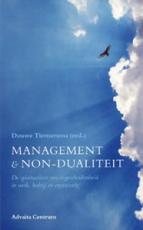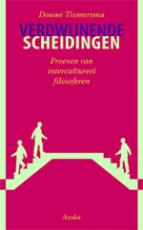Advaita Post #12-05 - Man is tragic through the experience of finitude...
Volume 12 No. 5 (April 9, 2011)
--- Man is tragic through the experience of finitude, even while there is the sense of being infinite; is there a solution to this fundamental conflict? ---
[tr: Silence is the certainty that never fails - Karel Van De Woestijne]
Why is that so?
*
In the quiet evening stands
the plum tree in blossom -
apparently as it must be.
The first blossom has already fallen -
that's how it goes; not otherwise.
With a broom I sweep the patio -
that also happens, by itself
In the quiet space where
everything is as it is,
without duality.
*
Dying and mourning - the non-dualistic perspective (Part 1)
Further explanation of the talk given at the Zuylen Funeral Home, Breda, January 18, 2009
The self-evident premise 'I am a finite person'
Everyone will be confronted with death sooner or later and experience it as something drastic. And so there is much written and spoken about it. Additionally, there are many different angles in which all kinds of expectations, ideas and opinions play a role. There is a stark contrast in the views on continued existence or non-existence following death of the body. Some say that after you die your soul lives on in a heaven or a hell, or that you enter into an intermediate zone from which follows a new reincarnation. Others argue that human existence is tied to the physical body and stops at its death. In neuroscience the spiritual aspect of people is viewed as a byproduct of the brain.
If you think that there is a life after this life, then you have a certain image of a human being in which people have not only a physical body, but also a soul. If you say that the stopping of the brain's processes immediately marks the end of the whole human being, you are a materialist in relation to human existence.
These deep-seated ideas about humanity can only be partially proved by argument. You can't just find and indicate the contents of these ideas. Also they can't be conclusively argued. Of course, there are different things that you can indicate, both for the one viewpoint as well as for the other, but you can see that there is no real proof for it. Yet these ideas form the foundation for many further ideas and for the way people behave. Therefore we call these ideas presumptions. You must believe in them and so they are beliefs. And that goes not only for all traditional religious ideas; it also applies to materialistic concepts. Thus the questions remain. Many simply let the questions stay open, because "you just can't figure it out".
Nevertheless, we can take a deeper look at the different presumptions, their nature and their boundaries. What is striking then is that all the various concepts still have a certain common core. What is fundamental to both the religious concepts as well as the materialistic ones is the basic problem of people who experience their life as finite. They almost always start from the standard idea that everyone is a person who is limited in space and time. The dominant starting point is the presumption of an individual who lives once and then dies. It's very obvious from that that we humans are at most 80, 90 or 100 years in the world and then die. So there is always the presumption of ourselves as a finite person and that presumption functions as a pattern that shapes all aspects of life.
So when we want to take a further look, it seems very important to investigate the accuracy of this premise. We shouldn’t just stand still with this assumption, we shouldn't stop questioning it too quickly. Especially in the confrontation with death questions arise about the validity of this presumption. Especially when there is decay, reflection on the question arises: what about it now? How does it look to me now? This question arises especially with dying because there is the experience: I am going to die. There is fear because your own existence is threatened. All possible axioms fall away. You look back with a final perspective. Then the limits of life become evident within a greater space and life itself becomes very relative. Then you ask questions about the most obvious ideas, about the accuracy of your identity as an individual and finite human being.
This position will therefore need to be investigated as a prejudice. A closer examination reveals that this identity is not necessary and not correct and that it is precisely this identity that is the source of all suffering.
"I am a finite person"
This existence of mine - what is it? I was born, I have a name, there is this life story; I have done this and that in life, I wanted this and I wanted that.... So I have a personal identity. The overall structure is that of an ego identity with which I am in the world, but also against the world. I am focused on that world. In addition, I don't want to lose myself, but instead to hold on tightly. I don't want to die, but live, keeping myself healthy and strong. This applies to almost everyone. Take a look at what you and other people do to strengthen the 'I' in life, to stay healthy and strong, to continue that life, to make their own 'I' bigger and more important. We call that egocentricity and so you see it almost everywhere. There is a general structure of separation and of orientation.
Through it there is a great concern for the 'I' and that is an ego tension: the tension of the desire of the ego-center to survive, to continue to experience life through the sphere of the 'I' and to resist the forces that can affect it.
The desire to expand your own sphere and to achieve something will possibly be fulfilled in some respects. But then you say: is that all there is? There are still a great number of things that you can't achieve. And then you are frustrated. You want to restrain all kinds of forces that threaten to attack you. That is particularly true when the forces are strong and when it is an attack on your existence as such. That brings fear. The I-worry that arises through separation comes forth out of fear, fear for your own life. When people grasp strongly onto the limited 'I' identity of the bodily person, then the suffering around dying will be strong. They are strongly attached to life, life as an 'I'-person, even though many aspects of the person are disappearing. The stronger the attachment, the more difficult the inevitable goodbye. You see that there is always suffering in the structure 'I am a finite person,' and with the egocentricity that goes along with it.
From the dominant viewpoint that man is finite what is the highest wisdom? You hear it everywhere: accept the finitude and live life as well as possible. People then act very pragmatically to enjoy, sometimes with a strong egocentricity, sometimes more expansively if it involves the good of society. Even then the frustration remains, the fear and the suffering, because life is not always pleasant.
We will have to investigate this situation of the finite person even more deeply. The person experiences the finitude of his existence, but apparently he or she is not satisfied with that. This is because there is a sense of their own infinity! No one can imagine an absolute end to themselves - think, yes, but not imagine. Everyone has a sense of unlimited-being, not being restricted, not even by death. Everyone opposes being objectified as a thing with fixed characteristics in time and space and that occurs on the basis of the sense that the self, as subject, is in principle free from these limitations.
So there are two notions. On the one hand there is the sense of being infinite and on the other hand, the experience of one's own finitude. This is the most fundamental conflict. This conflict is basic to the human situation. Therefore the human condition is fundamentally tragic. That's what the Greek tragedies are about. That's what all the "dramas" that are portrayed in films and novels are about. Human life and society are incredibly tragic. People want everything, but because they identify with limited things it all breaks apart in their hands. People want to be infinite, not to die, while they see that they are decaying and dying. That is the human condition.
Is there a solution to this fundamental conflict?
[To be continued]
Announcements
Message about Douwe
Eating is getting better and so the feeding tube has been removed. This means that most of the irritation and hassle surrounding the intake of food is over. The healing process can continue.
Although Douwe can't and shouldn't sit long at the computer, he can once again receive emails (dt@advaitacentrum.nl). Please send them only if they are urgent. The temporary plan of sending messages through others has now ended. Douwe is not available until April 16.
On Wednesday, April 13 there will be an open Advaita-evening at the Advaita Center. After listening to a portion of a Satsang from Douwe (on CD) there will be silence and meditation. Start 20.00.
On April 22 there will be a Meditation Day beginning from 10:00 at the Advaita Center. Prior registration is not required.
On Wednesday April 27 there will be a Satsang /advaita evening with Douwe.
The Retreat Week from June 17 to 24 will be led by Douwe. The approach will be approximately similar to previous ones - see Retreat Weeks on the Advaita Center website for information and registration.
Er is geen tweeheid
als je ontspannen bent
in zelf-bewustzijn
is dat duidelijk.
Boeken
Douwe schreef en redigeerde gedurende zijn leven boeken. Via onze uitgeverij zijn deze nog verkrijgbaar.



